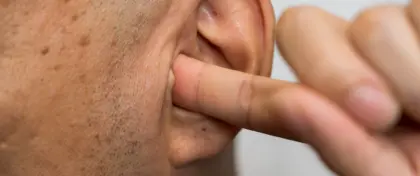
Understanding and Managing Dry, Itchy Ears
Dry, itchy ears can affect anyone, regardless of age. While it might be tempting to scratch the itch, doing so can often worsen the problem or cause damage to the delicate skin inside and around the ear.
At Coastal Hearing, our team explore the common causes of itchy ears and how to find relief safely, protecting your ears from harm.
What Causes Itchy Ears?
Itchy ears can result from various factors. When the sensitive skin inside your ear becomes irritated, damaged, or infected, it can lead to inflammation and itching, sometimes accompanied by discomfort. Although itchy ears don’t usually affect hearing directly, scratching with objects like cotton buds can cause injury and worsen the condition.
Some common causes include:
- Swimmer’s ear (an infection of the outer ear canal)
- Build-up of earwax (which may require professional removal)
- Dry skin inside the ear
- Allergies to foods like nuts, milk, or shellfish
- Use of hearing aids
- Hay fever
- Skin conditions such as eczema, dermatitis, or psoriasis
In some cases, itchy ears may also signal a middle-ear infection. Consulting your doctor can help identify the cause and ensure proper treatment.
Symptoms to Watch For
Beyond itching, other signs may indicate a more serious issue, including:
- Fluid or discharge from the ear
- Swelling or redness around the ear
- Fever
While itchy ears are generally not serious, persistent symptoms should be evaluated by a healthcare professional.
When to See a Specialist
Seek medical advice if you experience severe ear pain, bleeding, discharge, or any hearing loss. A healthcare provider will review your medical history and examine your ears for wax build-up, skin conditions, or signs of infection. They can then recommend the right treatment, which may include removing excess wax or treating eczema-like patches.
How to Prevent Itchy Ears
Prevention starts with good ear care habits:
- Avoid inserting objects into your ears, including cotton swabs, as these can damage the ear canal or push wax deeper.
- After swimming or bathing, dry your ears gently with a towel or use a hairdryer on a low, cool setting to prevent moisture buildup.
- If you notice that certain jewelry causes irritation, consider switching to hypoallergenic alternatives.
Home Remedies for Itchy Ears
For many, itchy ears are linked to dry or irritated skin, and treatments often focus on soothing and healing the skin. Common remedies include:
- Baby oil to soften dry skin
- Steroid creams or ointments prescribed by a doctor
- Medicated eardrops
Some natural remedies may also provide relief, such as:
- Aloe vera gel
- Diluted hydrogen peroxide
- Warm oils like coconut, olive, tea tree, or garlic oil
- A mixture of water and rubbing alcohol
Always check with a healthcare professional before trying home remedies to ensure they are safe and appropriate for your condition.
Final Thoughts
While itchy ears are rarely serious, it’s important to avoid scratching and to seek professional advice if symptoms persist. An audiologist or doctor can help diagnose the cause and protect your ear health.
If itchy ears are causing you discomfort, contact us for a thorough hearing and ear health check.
Free hearing health check:
📞 0800 054 8458
🖥️ Book Online
